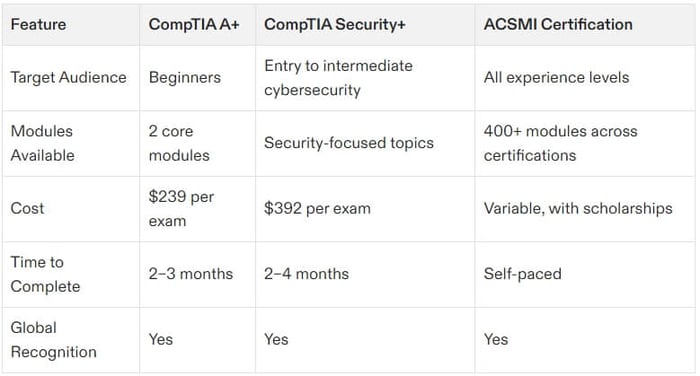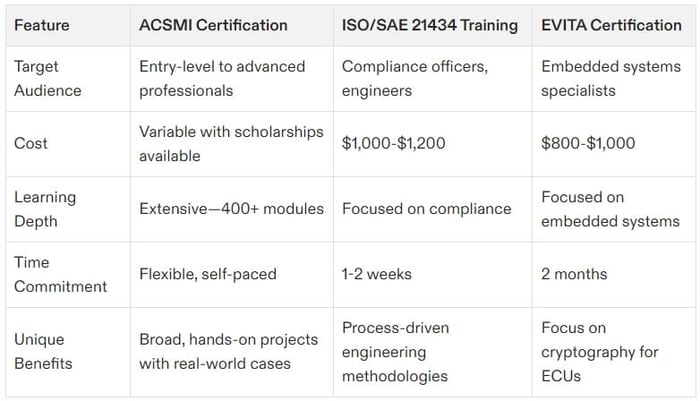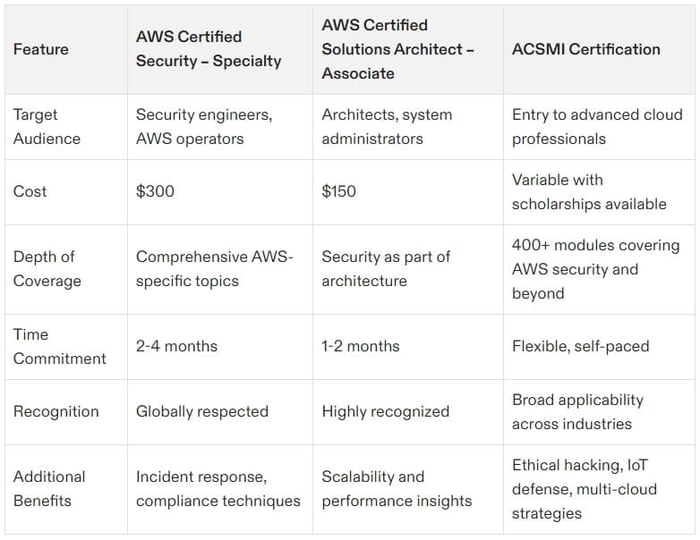Table of Contents
Cybersecurity certifications are essential stepping stones for advancing or even starting your career in the competitive and ever-growing cybersecurity industry. However, before diving into the certification process, it’s crucial to understand the cybersecurity certification fees involved. These fees can be a significant investment in your career trajectory, varying depending on the level of certification, the certifying body, and your geographical region. Artificial Intelligence in Security Technology is also becoming a vital part of the industry landscape, influencing both the demand for certifications and the skills professionals are expected to master.
This guide breaks down the factors that influence cybersecurity certification fees, offers tips on how to manage these costs, and provides an overview of how platforms like ACSMI can help reduce the financial burden of certification preparation. Whether you’re aiming for entry-level certifications like CompTIA Security+ or planning to tackle more advanced credentials like CISSP or CEH, understanding the costs involved will help you make smarter decisions when budgeting for your professional development.
What Are Cybersecurity Certification Fees?
Cybersecurity certification fees are the costs you pay to take an examination that validates your expertise in a particular area of cybersecurity. The fees for these certifications can vary significantly depending on the certifying body, the certification level, and your location.
For example, entry-level certifications like CompTIA Security+ are relatively affordable, with an exam fee of approximately $360, while more specialized certifications such as CISSP or CEH may cost $1,000 or more. Typically, these fees cover your exam registration and access to the exam itself. However, they do not often include additional costs such as study guides, practice exams, preparatory courses, or retake fees unless you purchase bundled packages that offer these supplementary resources.
Key Pricing Variations:
Entry-Level Certifications: $200–$400
Mid-Level Certifications: $400–$800
Advanced Certifications: $800–$1,200+
Understanding these costs is critical for effective career planning, ensuring that you are financially prepared for the certifications you wish to pursue.
What Factors Influence Cybersecurity Certification Fees?
There are several factors that influence how much you will pay for a cybersecurity certification exam. Recognizing these factors allows you to plan more effectively and manage your costs when pursuing multiple certifications or working within a fixed budget.
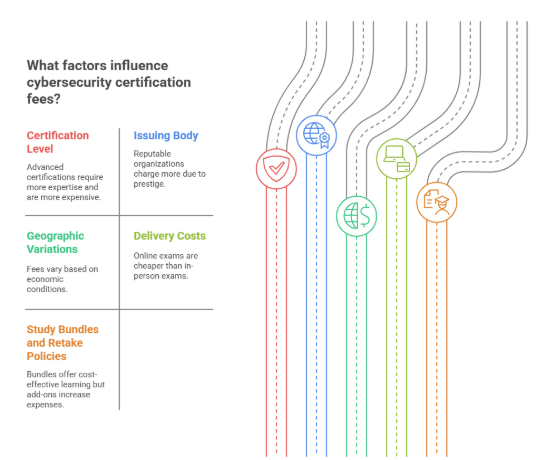
1. Certification Level
The level of the certification plays a crucial role in determining the exam fee. Entry-level certifications, such as CompTIA Security+, are less expensive and serve as the foundation of your cybersecurity knowledge. These certifications focus on basic concepts such as network security, risk management, and cybersecurity threat assessments.
On the other hand, advanced certifications such as CISSP or Certified Information Security Manager (CISM) are more specialized and often require years of experience. Because of the advanced knowledge and skills necessary for these exams, their fees are significantly higher, reflecting the level of expertise and preparation required.
2. Issuing Body
The organization offering the certification also has a significant impact on the cost of the exam. (ISC)², EC-Council, and ISACA are some of the most respected and well-known certifying bodies in the cybersecurity industry, but they also tend to charge more for their exams due to the credibility and prestige associated with their certifications. These organizations have a global reputation, and the value of their certifications in the job market can justify the higher costs.
Additionally, certain providers may offer industry-specific certifications (e.g., cloud security or ethical hacking) that have unique pricing structures based on demand and industry trends.
3. Geographic Variations
Certification exam fees can also vary depending on your geographic location. Many certification providers adjust their fees based on the economic conditions of the region in which the exam is being taken. For example, countries with a higher cost of living may have higher fees to account for local market dynamics, while regions with developing economies may offer reduced fees to make certifications more accessible.
Some organizations also offer regional pricing adjustments to reflect the local economic situation, which can make certification exams more affordable for professionals in specific areas.
4. Delivery Costs
The method by which the exam is delivered can also affect its overall cost. In-person exams conducted at testing centers often include administrative fees or extra charges for travel. If you choose to take an online proctored exam, the costs may be slightly lower since there are no facility or administrative fees involved. This flexibility allows you to save money while still obtaining your certification.
5. Study Bundles and Retake Policies
Many certification bodies offer bundled packages that include not only the exam fee but also study materials, practice exams, or even a free retake. These packages can be cost-effective as they provide a comprehensive learning experience for candidates. However, individual add-ons, such as advanced study resources or premium training programs, can increase the total expense. Some providers may also charge additional fees for retakes, especially if you fail the exam on the first attempt.
Strategies to Manage Cybersecurity Certification Fees
Security Technology Key Trends play a vital role in shaping how professionals approach certification planning. Managing the costs associated with cybersecurity certifications is crucial for both newcomers and experienced professionals. Here are some strategies to optimize your spending and minimize unnecessary expenses:
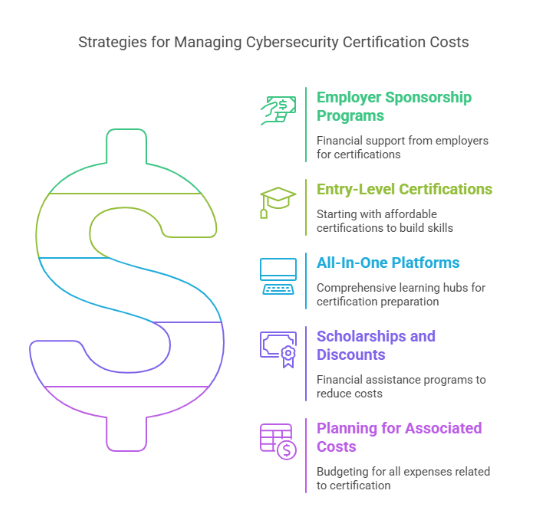
1. Explore Employer Sponsorship Programs
Many companies offer financial support to employees pursuing certifications as part of their professional development programs. Employer-sponsored programs may fully or partially cover the costs of your certification exams, study materials, and even retakes. Always check with your current employer to see if they offer reimbursement or sponsorship for cybersecurity certifications.
In addition to certification fees, some companies may also provide time off for studying or taking exams, making it easier for you to complete certifications while working full-time.
2. Start with Entry-Level Certifications
When starting your cybersecurity career, it’s advisable to begin with entry-level certifications that are more affordable. CompTIA Security+, for example, is an ideal first certification that lays the groundwork for more advanced credentials. By starting with certifications that have lower fees, you can build your skills and knowledge without a significant financial investment.
After obtaining an entry-level certification, you can pursue more advanced certifications like CISSP or CISM, which may require additional years of work experience.
3. Utilize All-In-One Platforms like ACSMI
ACSMI offers a comprehensive learning hub with over 400 modules that cover all aspects of cybersecurity certifications. Instead of purchasing multiple books, courses, and practice exams, you can consolidate all your study materials into one platform. This not only saves money but also ensures that you are using well-organized, up-to-date resources designed specifically to help you succeed in your exams.
ACSMI also offers a tailored approach, providing hands-on simulations and practical training exercises to help you prepare for real-world cybersecurity challenges. The all-in-one nature of the platform makes it a cost-effective solution for anyone aiming to earn multiple certifications.
4. Seek Scholarships or Discounts
Several certification bodies, including (ISC)², ISACA, and CompTIA, offer scholarships or financial assistance programs that can help offset the cost of certification exams. Additionally, some providers offer regional discounts or promotional pricing during special events such as Cybersecurity Awareness Month or Black Friday.
Look for these opportunities and take advantage of them to reduce the cost of obtaining your certification.
5. Plan for All Associated Costs
While the exam fee is a significant part of the certification process, it’s important to factor in all associated costs. Study materials, travel expenses (if applicable), and retake fees should all be considered when budgeting for your certification. Some providers offer bundled packages that include the exam fee, study guides, practice tests, and even the opportunity to retake the exam if you don’t pass on the first try. Be sure to plan ahead for these costs to avoid any financial surprises down the line.
How ACSMI Makes Cybersecurity Certification Fees Manageable
ACSMI provides an affordable and effective solution for cybersecurity certification preparation. With over 400 modules specifically designed to align with the requirements of popular certifications like CEH, CISSP, and more, ACSMI offers a tailored and flexible learning experience that minimizes the need for additional study resources. As the landscape of Cyber Threats evolves, ACSMI ensures that its curriculum is up-to-date, addressing the latest challenges in cybersecurity.
Here’s how ACSMI helps you manage cybersecurity certification fees:
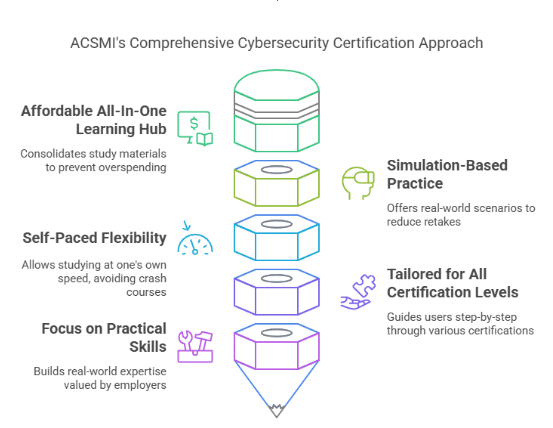
1. Affordable All-In-One Learning Hub
ACSMI consolidates all the study materials you need into one platform, preventing you from overspending on fragmented or irrelevant resources. The comprehensive nature of the platform ensures you have access to everything you need to succeed, including training modules, practice tests, and hands-on simulations.
2. Simulation-Based Practice
ACSMI’s hands-on simulations allow you to experience real-world cybersecurity scenarios. These exercises replicate the challenges you’ll face during the actual exam, preparing you thoroughly and reducing the likelihood of costly retakes. With ACSMI, you can practice your skills until you feel confident enough to tackle the exam.
3. Self-Paced Flexibility
The self-paced nature of ACSMI’s learning platform allows you to study at your own speed, eliminating the need for expensive short-term crash courses. You can take as much time as needed to absorb the material and develop the necessary skills before sitting for your exam.
4. Tailored for All Certification Levels
Whether you’re pursuing foundational certifications like Security+ or advanced credentials like CISM, ACSMI’s multi-level modules guide you step-by-step with precision. This structure ensures that you progress at a pace that suits your level of experience and expertise.
5. Focus on Practical Skills
Beyond exam preparation, ACSMI’s platform focuses on building practical skills that employers value. This means that your investment in cybersecurity certification fees will not only help you pass exams but will also provide you with the real-world expertise needed to excel in the cybersecurity field.
Final Thoughts
Understanding the costs associated with cybersecurity certifications is a crucial part of career planning. With proper management, you can avoid unexpected financial burdens and make informed decisions about which certifications to pursue. Platforms like ACSMI make it easier to manage certification fees by providing affordable, all-in-one learning solutions that reduce costs while ensuring effective preparation. By following the strategies outlined in this guide, you can optimize your spending and set yourself up for success in the competitive cybersecurity field.
Frequently Asked Questions (FAQs) About Cybersecurity Certification Fees
1. What is the average cost of cybersecurity certification fees?
The cost of certification exams can vary widely. Entry-level exams typically cost between $300–$400, while advanced certifications like CISM or CEH can cost over $1,000, depending on the certification provider and your location.
2. Are there hidden costs aside from the certification exam fee?
Yes. In addition to the exam fee, you should budget for study materials, practice tests, and potential retake fees. Administrative fees or travel costs for in-person exams should also be considered.
3. Can certification fees be reimbursed?
Many companies offer sponsorship or reimbursement programs for employees pursuing certifications. Be sure to inquire about your company’s policies on funding professional development.
4. How can I save money on cybersecurity certification fees?
Using platforms like ACSMI for all-in-one study resources, looking for discounts, and leveraging employer sponsorships are great ways to save money on certification fees.
5. Are bundled exam packages a good investment?
If the bundled package includes relevant study materials, practice exams, and retake options, they are usually a worthwhile investment. Be cautious of unnecessary extras that don’t contribute directly to passing the exam.



